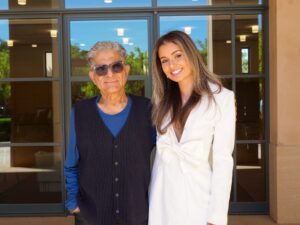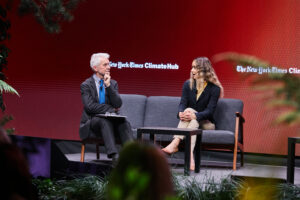
Meet Sophia Kianni, an Iranian-American activist and Stanford University student who is making waves in the climate change advocacy world.
As the founder and executive director of Climate Cardinals, an international nonprofit organization, Sophia has achieved the distinction of being the youngest United Nations advisor.
In addition to that, she has been selected to serve on the boards and advisory councils of several of the world’s leading organizations, including The New York Times, World Economic Forum, Web Summit, Environmental Media Association, Inkey List, Ashoka, American Lung Association, and Lady Gaga’s Born This Way Foundation.
During the interview, Sophia shared a couple of interesting resolutions about Climate activism and the main drive behind that.
The main inspiration for activism since a young age
Sophia’s journey is a testament to the power of activism and the impact that individuals can make in the fight against climate change.
Her initial passion for environmental activism was ignited at just 12 years old, during one of her visits to her parents’ home country, Iran.
She witnessed firsthand the devastating impact of pollution on the environment, with smog so thick it obscured the stars she wanted to trace in the night sky.
This experience sparked a deep desire to take action and make a difference in the fight against climate change.
Addressing the Disproportionate Impact of Climate Change on Marginalized Communities
“Climate change exacerbates existing social and economic inequalities, disproportionately impacting marginalized communities”
She describes the issue as being a serious matter when facing higher vulnerability due to limited resources and unequal access to healthcare, clean water, and infrastructure.
To address this issue, people must prioritize equity and justice in climate policies, ensuring marginalized communities are included in decision-making processes and have access to resources for adaptation and resilience.

The Power of Youth: How Young People Can Take Action in the Fight Against Climate Change
Sophia believes that young people have a crucial role to play in the fight against climate change.
Moreover, they can raise awareness, mobilize their communities, and demand action from policymakers.
It is, therefore, crucial to get involved, which can be as simple as joining local climate organizations, participating in climate strikes, engaging in advocacy efforts, and using social media platforms to amplify their voices.
What is a particular project or campaign that she is proud of?
“In middle school, I witnessed the disastrous impact pollution was having on Iran and was shocked to find my relatives knew nothing about climate change”
Sophia describes how she witnessed the disastrous impact of pollution on Iran and was shocked to find her relatives knew nothing about climate change.
Therefore, she found the strength and determination to educate her family, by translating climate science articles into Farsi.
Inspired by the success, she founded Climate Cardinals, the first organization working to make environmental education more accessible to people who don’t speak English.
Over the past few years, it has grown to 9,000 volunteers in 41 countries. Collectively, they have translated 1,000,000 words of climate and environmental information into 100 languages.
As the founder of Climate Cardinals, she has demonstrated a deep commitment to raising awareness of climate change and making environmental education more accessible to people around the world.
Notable partnerships include: working with the UNEP to translate their Youth #ForNature initiative into dozens of languages, creating the most widely distributed petition on planetary health; partnering with the Italian Government to translate the COP26 Youth4Climate manifesto into the UN Languages; collaborating with UNICEF to translate their Children’s Climate Risk Index Report into multiple Indigenous and African Languages.
Additionally, as the US Representative on the UN’s Youth Advisory Group on Climate, Sophia worked with the UN Foundation to host a US consultation to establish key environmental priorities that American youth wanted to communicate to educate the nation on the urgency of the climate crisis.
“We synthesized findings from 100 young people from 40 states”
Subsequently, she has also joined the American Lung Association as their first climate activist advisor, working to lobby the EPA and Biden Administration to strengthen their methane rules and to educate the American public about the dangers of air pollution on public health.
Addressing climate challenges and overcoming them
“One of the biggest challenges is the lack of political will and global cooperation”
Overcoming this challenge requires strengthening international agreements, fostering collaboration between governments, businesses, and civil society, and emphasizing the urgency and interconnectedness of climate action.
Additionally, addressing the economic and social barriers to sustainable practices and transitioning to a low-carbon economy is crucial.
Innovative Solutions and Technologies for Reducing Greenhouse Gas Emissions
“Renewable energy sources like solar and wind power are promising solutions for reducing greenhouse gas emissions”
Additionally, a couple of energy efficiency measures, sustainable transportation systems, and nature-based solutions such as reforestation and ecosystem restoration can contribute to mitigation efforts.
Furthermore, advancements in carbon capture and storage technologies hold the potential for reducing emissions from existing industries.

Finding Your Voice in Climate Activism
“I would advise them to start by educating themselves about the science and impacts of climate change”
Sophia further replied that people willing to make an environmental impact can find local climate organizations and join efforts aligned with their interests, whether it’s advocacy, community engagement, or raising awareness through art or social media.
Collaborating with like-minded individuals and learning from experienced activists can also provide valuable guidance and support.
Promising Applications of AI and Machine Learning in the Fight Against Climate Change
“AI and machine learning have immense potential in climate science”
They can enhance climate modelling and prediction accuracy, enabling us to better understand the intricate processes driving climate change.
AI can also help analyze large datasets, identify patterns, and make more informed decisions for climate adaptation and mitigation strategies.
Additionally, it is suggested that machine learning algorithms can assist in monitoring deforestation, analyzing satellite imagery, and identifying areas at high risk of climate-related disasters.
Deploying Solutions to Tackle Climate Change
Ethical considerations are paramount when developing and deploying technology to address climate change.
“We must prioritize equity, ensuring that technological solutions do not exacerbate existing inequalities or disproportionately burden marginalized communities”
Privacy and data protection are also crucial, as climate-related technologies often involve sensitive information.
Transparency and accountability in the development and deployment of these technologies are essential to ensure public trust and prevent unintended consequences.
Ensuring inclusive and equitable implementation of technological solutions
“climate change requires a deliberate focus on accessibility, participation, and representation”
Sophia explained that the process of engaging diverse stakeholders, including marginalized communities, in the design and decision-making processes is crucial.
Moreover, implementing policies that address disparities and provide equal access to technology, education, and resources is essential.
Therefore, fostering collaboration between governments, technology developers, and communities can lead to more inclusive and equitable deployment of climate-related technologies.
Carina Schuster is a multilingual tech and science editor for The London Financial & a podcast anchor and producer for SciTech Suisse, covering groundbreaking stories in the matter of disruptive technology developments and interviewing top experts in AI, the Metaverse, Web3, Blockchain and scientific research. Throughout her experience as a journalist in the editorial and digital worlds, she was selected by CNN Money Switzerland in 2020 as a digital producer intern and has demonstrated a collaborative and creative spirit, working alongside talented journalists and delivering impactful stories with the main aim of simplifying the complexity of technology.

Hiya, I’m really glad I have found this info. Nowadays bloggers publish only about gossips and net and this is actually frustrating. A good blog with exciting content, that is what I need. Thanks for keeping this web site, I will be visiting it. Do you do newsletters? Can’t find it.
It’s hard to find knowledgeable people on this topic, but you sound like you know what you’re talking about! Thanks
Wow! Thank you! I continually needed to write on my blog something like that. Can I implement a portion of your post to my website?